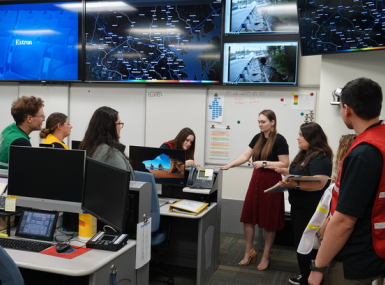Help your most vulnerable in a disaster with a special needs shelter
If your county is looking for a solution to helping your most vulnerable population when disaster strikes, the answer might be a special needs shelter.
Palm Beach County (Fla.) Commissioner Gregg Weiss told a packed room of NACo members Sunday at NACo’s Legislative Conference to prepare to help those populations who might have difficulties helping themselves when disaster strikes.
Weiss made his comments at the “Preparing Vulnerable Populations for Disasters: A Meeting of the Resilient Counties Advisory Board” meeting chaired by Hawaii County Council Chairwoman Valerie Poindexter.
NACo President Mary Ann Borgeson also stopped by the meeting with a message: Counties need to think about how they can help their elderly populations age gracefully in place. (Borgeson also asked members to stop by a workshop Monday on Leveraging Federal Policy to Strengthen Networks of Support for Aging Americans.)
In addition to the elderly, Weiss said that counties also need to consider the needs of the homeless, lower-income families, young people and children when it comes to caring for them during disasters.
Ahead of a disaster, some of the things a county can do ahead of time, he said, include:
-
Conducting outreach activities throughout the year.
-
Guiding persons with special needs to a special needs shelter program so the county can assess their needs.
-
Creating a list of special needs shelter clients.
-
Asking residents to prepare to shelter in place for at least three days, with supplies of food, water and medicine.
-
Assessing the needs of your vulnerable population with a survey.
-
Making arrangements to identify people with special needs in advance when the power goes out, such as those on oxygen.
-
Talking to retirement communities.
-
Getting on every media (radio, TV, newspaper, online) to get the word out.
What is a special needs shelter?
Weiss gave some definitions of what a special needs shelter is (and also what it is not): It provides a setting for those with certain medical needs and others to remain independent during a disaster; it is staffed by licensed medical personnel, contractors and county staff who provide medical observation and assistance when necessary, and it is not a healthcare facility. Clients are expected to provide their own care, and caregivers as required to maintain their health.
Attachments
Related News

SBA issues new rule affecting local permitting in post-disaster rebuilding
The U.S. Small Business Administration (SBA) has issued an interim final rule that changes how rebuilding projects financed with SBA disaster loans following a Presidentially declared disaster interact with state and local permitting requirements.

USDA and HHS release new dietary guidelines
On January 7, U.S. Department of Agriculture Secretary Brooke Rollins and U.S. Department of Health and Human Services Secretary Robert F. Kennedy, Jr. unveiled the new Dietary Guidelines for Americans, 2025–2030.

Cross-training helps county 911 scale up for big emergencies
With training, Howard County, Md. staff help filter and respond to non-emergency requests for information and assistance during period of heavy 911 call volume.
